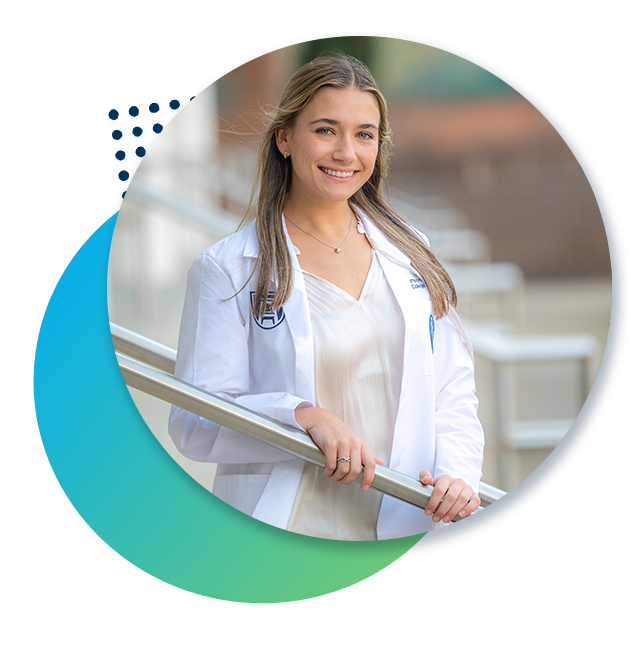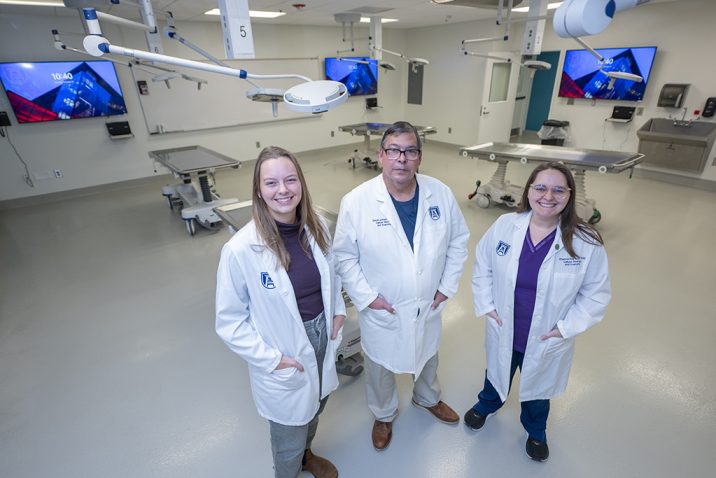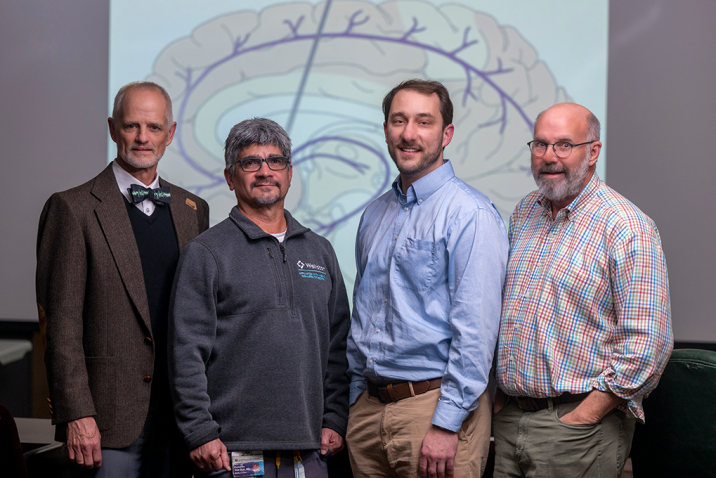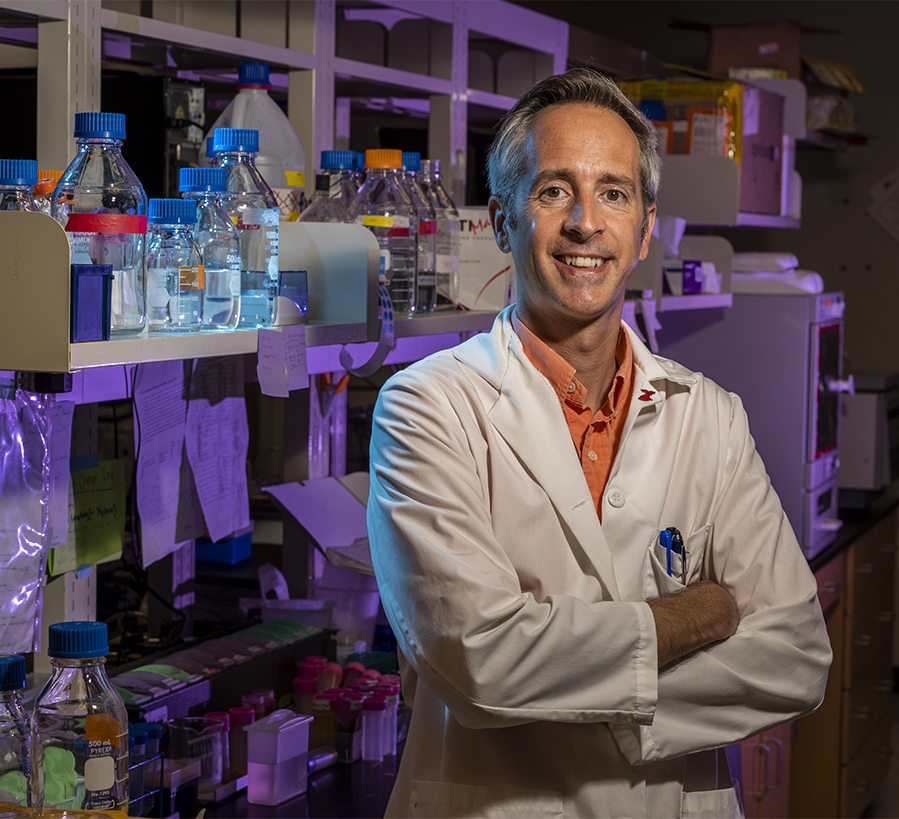Vascular Biology
As part of the Vascular Biology PhD program, you’ll be guided by a team of established, well-funded investigators. You will be trained using state-of-the-art equipment and novel techniques to better understand the mechanisms of disease and the development of new treatments.
Vascular biology students study the function of the cardiovascular system in health and disease, with research ranging from heart failure and kidney disease to acute lung injury and sickle cell disease.
Vascular Biology is for you if you consider yourself
Life-Changing
Life-Saving
Education
Want to learn more about the Vascular Biology program at Augusta University?
Request InfoWhat You'll Study
Coursework
The multidisciplinary core curriculum provides a broad-based foundation of knowledge and cultivates critical thinking skills. Additional opportunities and upper-level courses build professional, educational, and leadership skills.
Students in Augusta University’s Doctor of Philosophy in Vascular Biology program are admitted via a common admissions process to the Biomedical Sciences doctoral programs. After completing the first-year core coursework and laboratory rotations, students choose a dissertation research mentor and enter the Vascular Biology program.
The average time to complete the degree is approximately five years of full-time, year-round study
Curriculum | Admissions Criteria | Tuition and Fees | Application Deadlines



EXPLORE. EXCEL. EXPAND.
Graduate School Advantage
Augusta University's graduate programs are among the best in the nation – and the world – and our graduate students are our most valuable assets. To ensure that our students earn more than a degree, the Graduate School offers a range of opportunities so they can develop the leadership, communication and personal skills needed for a rewarding life and academic, research or professional career.
See what the Graduate School has to offer »
About the Graduate SchoolExperience-based Education
Outside the Classroom
The Vascular Biology Research Seminar Series invites recognized researchers from across campus and across the nation to discuss the latest advancements in vascular research.
Fellowship Success
The program has enjoyed 10 American Heart Association Fellowships and two NIH Predoctoral Fellowships in the last five years.
Unique Program
The Vascular Biology program at Augusta University is the only program in the nation to have a formal center dedicated to vascular biology research.
Financial Support
Students may qualify for financial support, including the NIH Predoctoral Training Grant in Integrative Cardiovascular Biology administered through the VBC and an American Heart Association Predoctoral Fellowship.
Accomplished Faculty
Internationally recognized faculty in cardiovascular and neuronal physiology conduct groundbreaking research in a collaborative and supportive research environment.
Your Future
Career Options
Graduates of the program have gone on to careers at top level research institutions, the pharmaceutical industry, NASA, and dental and medical schools.
According to the U.S. Bureau of Labor Statistics, median pay for a medical scientist was $100,890 per year. Job growth for medical scientists is projected to rise much faster than the average.
Profiles
Student Stories
The Vascular Biology Center has an excellent history of graduate students obtaining funding through predoctoral fellowships. It is highly collaborative and offers many unique opportunities to effectively prepare you for postdoctoral success.
Candee Barris
The Vascular Biology Center is fantastic with hosting events and celebrations to bring students and faculty closer. I was initially intimidated by many of my peers; however, this quickly changed with the incredibly welcoming and supportive environment the faculty work hard to foster.
Jaser Doja
Admissions Criteria at a Glance
GPA: Overall GPA of 3.0 on a 4.0 scale at the Baccalaureate level calculated on all undergraduate work.
Degree Requirement: Minimum of a Bachelor’s degree or equivalent from an accredited college or university.
Transcripts: Official transcripts are required from all universities and colleges ever attended. Unofficial transcripts from US colleges and universities can be used in the admissions review process in lieu of official transcripts for this program.
Standardized Test Requirements: None are required for this program.
Letters of Recommendation: Recommendations from three individuals must be submitted through the application portal.
Resume: Applicants must submit a resume or curriculum vitae within the application portal.
Research Experience: Research experience is required for admission. Within the application, you will be prompted to provide both personal and research statements. Please consult the application for the full statement prompts.
International Students: Please review the verification process for international transcripts and the english proficiency requirement.
Tuition & Fees Estimate
$4,801*
Estimated total
Full-time / In-State / Per Semester
$401
Tuition Per Hour
$675
Mandatory Fees
View Detailed Program Tuition
*Tuition & Fees listed here are for in-state students enrolling in the university for Fall 2025 semester.
Detailed Program Tuition InformationApplication Deadlines
Fall '26 International Deadline**
- December 1, 2025
Fall '26 Deadline
- December 1, 2025 - extended to December 15, 2025
Early submission of all application materials is strongly advised.
All required application materials and documents must be received in order for an application to be considered complete and before an admission decision can be made. The program does not accept applications after the published application deadline, however the program will continue to accept application materials up to 2 weeks after the application deadline.

Why Augusta?
Students will build leadership skills by regularly presenting their research data at national and international conferences.
Studying on Augusta University’s Health Sciences Campus puts students in the center of its biomedical research enterprise, with access to the Georgia Cancer Center, the Medical College of Georgia and the state’s only public academic medical center.
As a part of the Vascular Biology Center, you have access to the latest technologies and the support of established, well-funded investigators.

Families leave lasting contribution to medical science with body donations
Families leave lasting contribution to medical science with body donations
MCG starts human trials on deep brain stimulation for Alzheimer’s patients
MCG starts human trials on deep brain stimulation for Alzheimer’s patients

